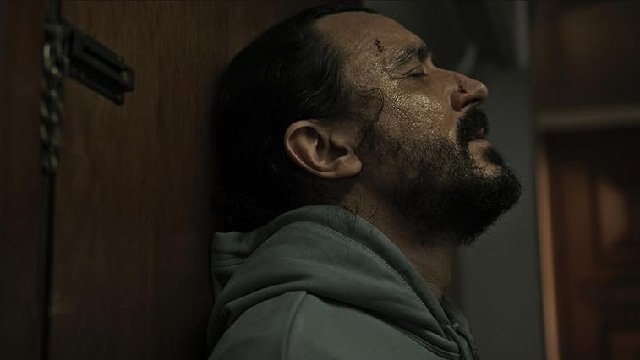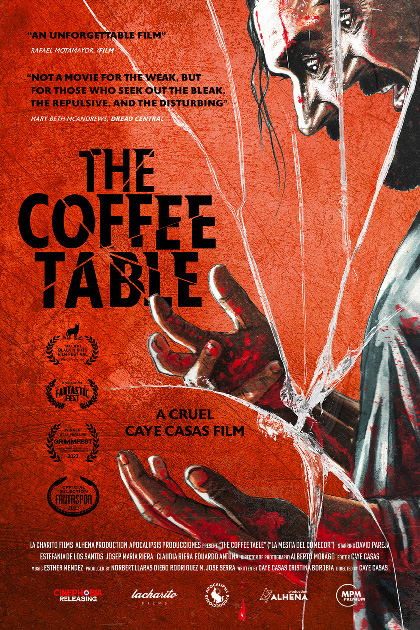

Monday May 20, 2024 | Movie Reviews | Neal
"The Coffee Table"
review by "The Mink" Troy Minkowsky
"The Coffee Table"

Movie Review: The Coffee Table (2022)
This film is available for rental or purchase on multiple platforms.
Amazon
Caye Casas’s “The Coffee Table” (or “ La Mesita Del Comedor” in its native Spanish) is perhaps the most impressive tight-rope act of walking between horror and comedy I have ever witnessed. Yet there are no traditional scares nor are there any giggle-inducing moments. Its alchemy of genre is nothing I’ve ever seen before.
I went into this movie completely blind, neither knowing the plot to “The Coffee Table” or any of Casa’s previous works. I would recommend viewers do that same, with a small warning that the horror of “The Coffee Table” is significantly horrible. I can see people needing to “nope out” once the inciting incident happens. I will start this review spoiler-free and give a warning when I get the inciting incident.
When “The Coffee Table” began I was luke-warm to it, finding it mostly amusing by being so odd. It starts with Maria (Estefanía De Los Santos) giving birth to her son Cayetano. We then abruptly find ourselves in a furniture store. Maria’s husband Jesus (David Pareja) is looking to purchase a rather hideous coffee table. This table is two golden nude art deco women holding up a glass plate, resembling more a religious altar than something to decorate a house. Maria scolds her husband considering this purchase and the salesperson (Eduardo Antuña) for hoodwinking them. When Maria leaves in a huff Jesus buys the table out of spite.
Neither Maria or Jesus come off as particularly likable. While showing us that this couple is going through a rough patch despite having a newborn. Maria comes off as nagging and nasty while Jesus comes off as stubborn and dumb. This purchase seems to come off as an act of defiant pride than practical purchase. We are never clued to why they need a coffee table or why Jesus was drawn to this gaudy object. Again, not knowing anything of the plot I assumed the table was haunted or something supernatural and was now waiting to see what form that was going to take.
When Maria and Jesus return home Jesus is confronted by his 13-year-old upstairs neighbor Ruth (Gala Flores). Ruth is aggressively pursuing Jesus believing that they are destined to be lovers despite Jesus’s insistence that it’s a misunderstanding. This exchange could be seen as cringe humor as the girl is so direct and explicit, but mostly it’s uncomfortable because its adult writers are making a kid talk this way. It’s also not clear if Jesus is actually grooming Ruth. For example the girl points out that Jesus sent her love poetry, but Jesus said he did that for one of her homework assignments. While we are led to believe this girl is just going overboard with a crush I questioned why Jesus was helping her with her homework involving love poetry regardless. While it seems this plot point was played for laughs I still suspected Jesus of doing something.
The theme of inappropriate relationships continues as Jesus’s middle-aged brother Carlos (Jjosep Maria Riera) is coming to visit with his eighteen year old girlfriend Critina (Claudia Riera) with Maria straight-up calling Carlos a “pedo”, but Jesus has her tuned out, instead hyper-focused on constructing this coffee table
At this point we’re stuck with unlikeable characters acting a bit over the top and I’m suspecting once Jesus completes this coffee table it’s going to start to talk and grant wishes. However despite feeling disjointed and ham-fisted at first in hindsight it perfectly sets up the dominos for the chaos that follows it.
From this point on we will be entering strong spoiler territory. Again, for maximum impact I highly suggest going into this movie as blind as possible. Everything I have mentioned prior is only the first twenty minutes. From this point on I’ll be discussing “The Coffee Table” fully.
Maria leaves to get food and wine for their expecting guest, leaving Jesus alone with Cayetano, who is crying at the top of his lungs. Jesus, who is already stressed because this new coffee table is missing a screw and can’t be completed, cannot make his son stop crying.
And then it happens.
Jesus smashes Cayetano into the glass coffee table, decapitating him.
The audience does not witness this event, we just hear it from the other room. Cayetano’s cries are interrupted by the shattering of glass and then silence. If Jesus accidentally dropped his son or threw him in a fit of rage is left up to interpretations. When the camera returns to him Jesus is covered in blood and glass completely shell shocked. He then starts to cover up the crime, placing the body of his son in his crib and picking up the broken coffee table. He even ventures upstairs to ask Ruth for cleaning supplies promising they will run away together if she gives it to him. All of this just to buy mere specks of time as this deception will not last long.
And after this point, after this horrific event, both Jesus and Maria are intensely empathetic. Jesus because he is now in a nightmare scenario because of a momentary mistake he can’t undo. Maria because she’s a mother who doesn’t know that her baby is dead. This is made even more tragic given that Maria is in her late 40’s this was her only chance at motherhood. From this point on until the end of the movie the audience is locked into a state of anticipation and dread.
This brilliantly plays off the fear parents have of inadvertently hurting/killing their child. Newborns are especially vulnerable. I remember when my own child was a few months old and the dread of accidentally dropping her due to a hand cramp or tripping on something. I became overly cautious and hyper-aware of my surroundings, willing to break a bone falling down awkwardly if it meant she was safe. I took making sure this tiny little life would make it out alive very seriously, even if it was walking slower than usual from the kitchen to the living room.
And at this point you may be asking yourself “How the Hell is this a comedy?”
To clarify there is no slapstick or one-liners. Everyone is playing the situation straight. If you let out a laugh it’s because the situation is that horrific. It’s beyond imaginations, and I say this expecting a wish-granting coffee table. It reminds me of a newspaper story from last week where a man crashed his car and was ejected onto the road only to be dragged into the forest and eaten by a bear that was passing by. All of that is completely tragic, but the horrific stacked on more horrific leads one to involuntary chuckle just to have a release.
There is also something very much a sitcom feeling to everything, a situational comedy without the laugh track. Imagine a Full House episode where Joey accidently killed Michelle and had to rush to cover it up before Danny gets home. All the characters fit into the sitcom mold. Jesus is the self-absorbed husband, Maria is the put upon wife, Carlos is the wacky younger brother who happens to be dating someone way out of his league.Even Ruth’s over-the-top romantic devolution could be played for laughs on any TGIF show in the 90’s.
The only evidence I have of Casa intentionally making an anti-sitcom movie is a scene with Maria in a grocery store. A man walks up to Maria and asks for a recommendation for wine. Maria says she enjoys the brand she is holding, so the man takes the bottle out of her hand and walks away, leaving Maria a bit bewildered. If this was on “Perfect Strangers” this bit would have gotten a laugh, but removed from the verisimilitude of the sitcom for a reflection closer to reality we become aware how uncomfortable such an interaction would actually be.
When everything comes to a head when Cayetano's head is discovered under the couch by Ruth’s dog both Maria and Jesus kill themselves by jumping off the balcony. Fortunately Casas gives us a little mercy for making it through his nihilistic romp. First, the final line uttered comes off like a punchline for the entire movie that did make me laugh. The second is a quick flash of Maria and Jesus doting over Cayetano over the Coffee Table (which I guess technically died as well) as if to say because of all the trauma Casas put his characters through they get to be happy in the next life.
Did I enjoy “The Coffee Table”? Despite the rocky start I was won over and it has all the makings of a cult classic. Would I recommend “The Coffee Table” to others? Perhaps if I knew they had a taste for black comedy, otherwise I’d assume infanticide is a no-go for most people.